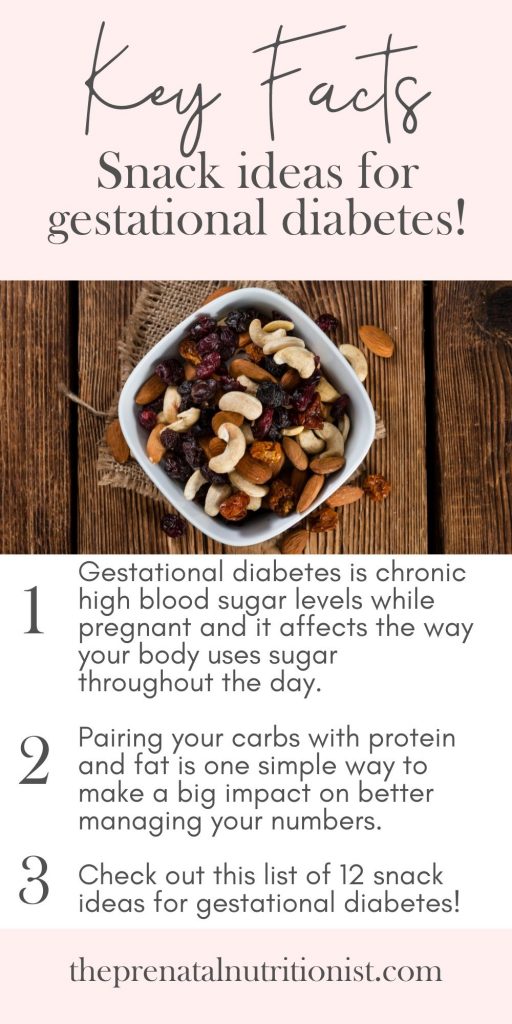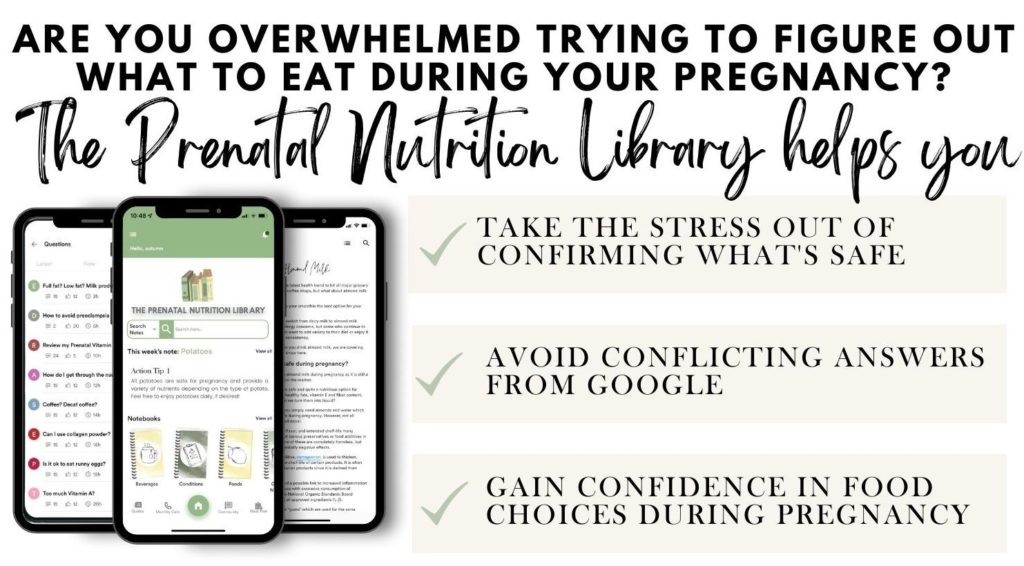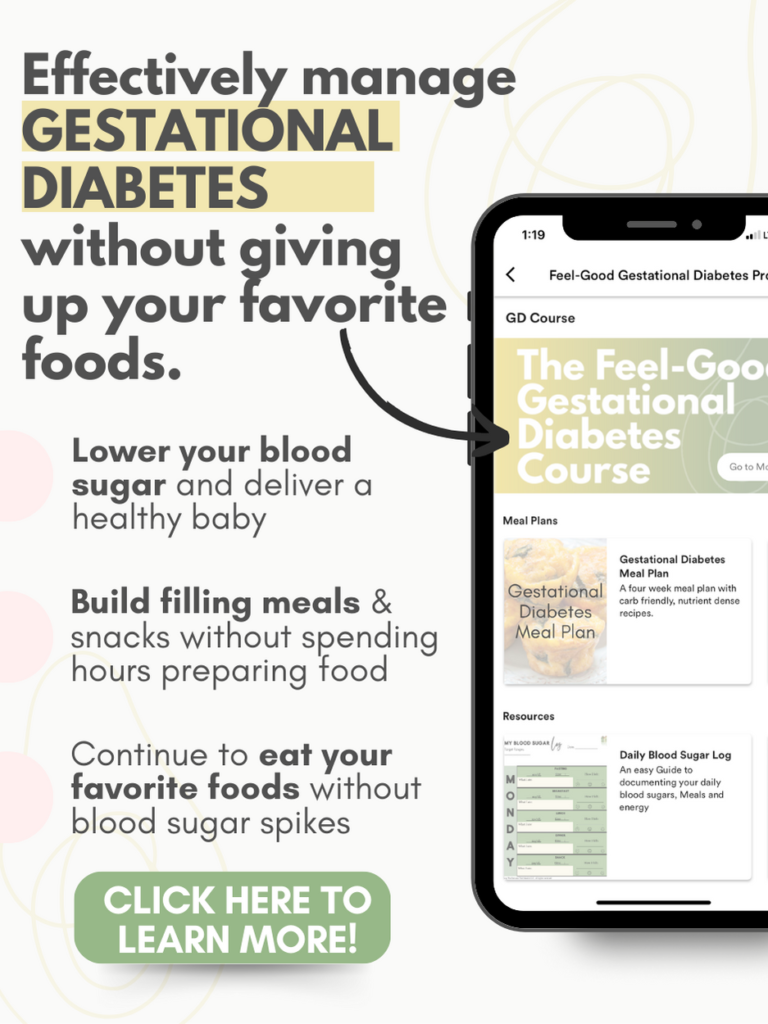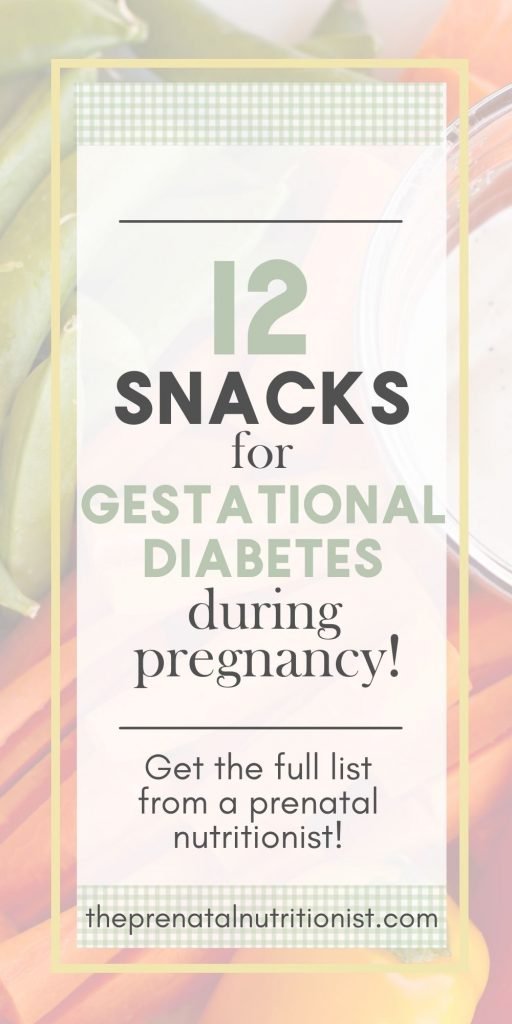
12 Snacks For Gestational Diabetes During Pregnancy
During your pregnancy, you will be tested for gestational diabetes. Testing is usually done in weeks 22-28 of pregnancy but may be done earlier if certain risk factors are present. Most sources agree that gestational diabetes refers to a form of diabetes that first develops in pregnancy and was not present before or is first recognized during pregnancy.
The body may not be making enough insulin or is not using insulin as it should, a condition called insulin resistance. More simply put, gestational diabetes is when something is going on in the body causes high blood sugar and disruption to how your body is handling sugar (glucose).
The Centers for Disease Control (CDC) estimates that between 2% to 10% of pregnancies in the United States are affected by gestational diabetes every year. When left unmanaged and uncontrolled, gestational diabetes can have serious side effects on the mother and baby. Side effects can range from symptoms such as increased thirst to difficulty breathing, low or high blood sugar, fatigue, nausea, high birth weight, and, unfortunately, even preterm birth or stillbirth. The good news is that gestational diabetes is very treatable, and maintaining a healthy diet can help manage blood sugars and gestational diabetes. And thus, support a healthy pregnancy for mom and baby. And, if you are ready to learn exactly what to eat to lower your blood sugar and deliver a healthy baby with gestational diabetes, join our feel-good GD course here (join through this link and get a BONUS 4-week meal plan).
It’s important to know that managing gestational diabetes is essential for mom and baby but that doesn’t mean you can’t enjoy a healthy snack. A significant step towards better blood sugar management is through a well-balanced diet. Pairing carbohydrates with protein and healthy fats is a simple shift that can substantially impact blood sugars. I like to refer to this as “no lonely carbs.” Remember, you can satisfy your cravings and meet your body’s nutritional requirements without causing an excessive spike in those blood sugar levels with a few tweaks!
12 Snacks For Gestational Diabetes During Pregnancy
Let’s look at a variety of well-balanced snacks low in sugar to help you reach your prenatal nutrition goals – including having a happy and healthy pregnancy with blood sugar control!
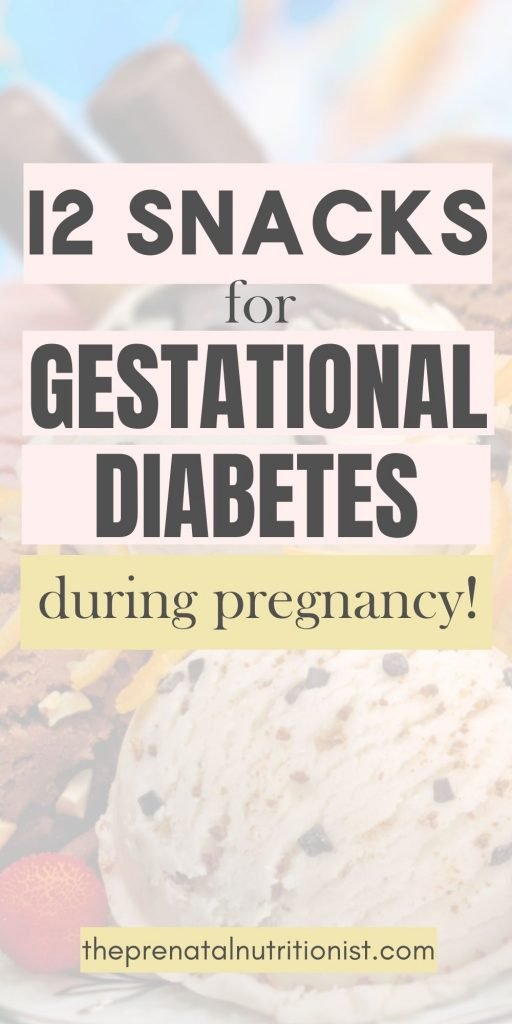
Veggie snack plate
You can’t go wrong with a fresh-cut veggie snack plate for gestational diabetes-friendly snack choices. Vegetables like carrots, broccoli, celery, bell peppers, tomatoes, and cauliflower are great options. These vegetables contain minimal carbohydrates but are still chock full of essential vitamins, minerals, and fiber to keep you feeling full and healthy. Pair them with a dip like guacamole, Greek yogurt, cottage cheese, or nut butter to bump up the protein and fat and further promote blood sugar balance and satiety!
Berries
Fresh fruit is a nutrient-dense food choice. It is, however, a source of carbohydrates and should be consumed in moderation. Berries are a higher-fiber, lower-sugar fruit rich in vitamin C and antioxidants, making them a good choice for those with gestational diabetes. Not to mention, berries are a pregnancy “superfood.” Pair your berries with full-fat Greek yogurt, nuts, or trail mix to increase protein and healthy fats.
Plain full-fat greek yogurt
Eating yogurt during pregnancy, especially when diagnosed with gestational diabetes, is a great snack. Greek yogurt is full of healthy fats and vitamin B12, selenium, calcium, folate, and more – wow! It even has a whopping 12 plus grams of protein per serving. Plus, the fat found in full-fat Greek yogurt is filling and is beneficial for fertility. Feel free to jazz up your yogurt by adding nuts, seeds, fresh fruit or berries toppings.
Steel-cut oatmeal
Eating oatmeal during pregnancy has a plethora of benefits. These include boosting energy levels, helping to maintain a healthy weight gain, and keeping you feeling full. Steel-cut oatmeal is also a source of complex carbohydrates, which are carbohydrates that break down slower and thus help prevent significant spikes or declines in blood sugar. This can help keep your blood sugar levels stable, which is essential for all pregnant mamas, not only those diagnosed with gestational diabetes.
It is important to remember that it is still a source of carbohydrates when it comes to oatmeal, so keeping portion size in mind is key. Also, add some protein and healthy fats to your next oatmeal bowl. Nut butter, seeds, collagen peptide powder, and protein powder are good options to boost the protein in your oatmeal. You can also add eggs when cooking to increase both protein and choline! A win-win!
Hard-boiled eggs
When we think of hard-boiled eggs, we think of protein. But, they have much more than that. Just one hard-boiled egg contains about 6 grams of protein and vitamins A and D, calcium, and iron.
This snack is easy to take and can help those with gestational diabetes feel full and energetic all day long. Additionally, boiled eggs contain only 1 gram of carbohydrates per egg! My favorite part about eggs is that they are a great source of choline, a super essential nutrient for baby’s development.
Nuts
Are you nuts for nuts? Then this is the perfect snack for you! Nuts are a nutrient-dense food choice, a great snack for anyone, including those with gestational diabetes, and you can easily take them on the go with you.
The nutrients found in nuts vary between the different types but include antioxidants, protein, fiber, vitamin E, selenium, and copper – to name a few. Next time you need a filling snack, grab walnuts, peanuts, almonds, cashews, or pecans. Or, feel free to create a delicious nut mixture of your own. When it comes to nuts, the options are endless!
Peanut butter (nut butter)
Do you love apples and peanut butter? Or better yet, are you one who loves eating peanut butter right off the spoon? Great! Despite some common misconceptions, peanut butter is safe to consume during pregnancy. As with most foods, moderation is key! It’s ideal to choose a nut butter option without added sugars and vegetable oils.
There are also so many other great types of nut butter besides peanut butter, such as walnut butter, almond butter, cashew butter, pecan butter, etc. The number of carbohydrates in nuts will vary. Cashews contain about 9 grams of carbohydrates per 1 ounce serving, and peanuts contain 5 grams of carbs per 1 ounce serving. Pairing nut butter with apple slices or celery sticks makes for a delicious snack!
Seeds
Seeds are an excellent source of minerals that are needed in higher amounts during pregnancy. They are a good source of heart-healthy unsaturated fats to help keep blood sugar stabilized. Seeds contain omega-3 and omega-6 fatty acids, copper, protein, and magnesium.
But, which seeds are the best to eat with gestational diabetes? There’s no one best choice; pick what you enjoy. Seeds like flax seeds, hemp seeds, chia seeds (great if you are constipated!), sesame seeds, and pumpkin seeds are great additions. You can add seeds to your oatmeal, trail mix, stir-fry, yogurt, or even your next batch of hummus.
Trail mix
We’ve already mentioned some great ingredients that you can add to a little homemade trail mix, so why not make one yourself? Making a homemade trail mix is a great snack to take anywhere and a great way to roll all your favorite foods into one delicious and nutritious snack. Plus, the ingredients in trail mix are usually high protein sources that can also support muscle and help improve your immune system.
Feel free to add a variety of nuts, popcorn, dried fruits, seeds, unsweetened coconut shreds, and even a bit of dark chocolate to your homemade trail mix. Choose unsweetened dried fruits if you decide to add these, and keep the portion size in mind. This way, you can ensure that you keep the carb and sugar count down to be more blood-sugar friendly.
Homemade hummus
Hummus is a delicious and creamy snack made from chickpeas. Other common ingredients include tahini, garlic, lemon, pepper, sesame seeds, and olive oil! During pregnancy, we recommend making your own homemade hummus. This way, you have control over food safety practices and you can make the recipe to your liking.
On average, 2 tablespoons of hummus contains 3 grams of protein, 3 grams of fat, and 4 grams of carbohydrates. And, the best part is that hummus is also a good source of nutrients like fiber, iron, vitamin B-6, and magnesium. You’ll love dipping some freshly washed and cut veggies like bell peppers, carrots, and broccoli or grain crackers into your hummus!
Homemade guacamole
Hmmm…who doesn’t just love guacamole? Like hummus, when it comes to guacamole, it’s best practice to make it fresh at home. This way, you can ensure that it was prepared with food safety in mind and reduce the risk of food borne illness and contamination with bacteria.
One half-cup serving of guac is full of healthy fats and contains only 8 grams of carbohydrates, making this a snack great for those with gestational diabetes. This snack also contains folate, magnesium, vitamin C, fiber, and potassium. Feel free to dip any mix of freshly cut veggies or grain crackers in your guac or spread it on a piece of sprouted whole-grain bread or rice cakes. Then, eat up!
Green smoothies
Last but not least, we have green smoothies – yes, please! Believe it or not, they are one of the best drinks for early pregnancy but can be consumed throughout all trimesters. Smoothies can be an amazing snack for those with gestational diabetes because they are loaded with vitamins and minerals.
BUT, if smoothies are not well planned and loaded with only fruit and lack protein and healthy fat they can be a blood sugar disaster! So, be sure to add ingredients like plain full-fat Greek yogurt, protein powder, collagen peptides, nut butter, and seeds to your next smoothie. When well-balanced they can help keep mothers like you hydrated, energetic, and full. Not sure which green smoothie to make next? Try one of these!
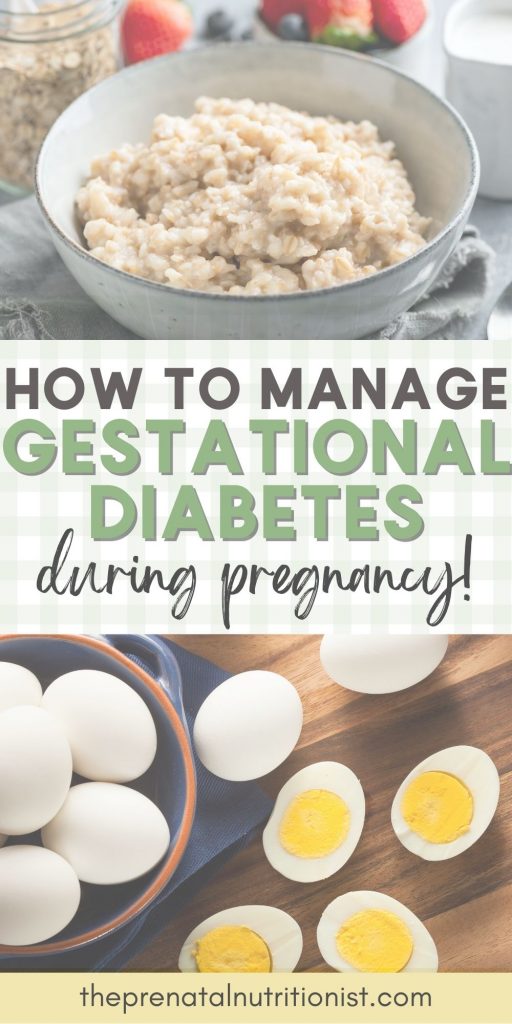
Have you been diagnosed with Gestational Diabetes (GD) during pregnancy?
Well, first things first, try not to stress or be hard on yourself! You’re not alone! And, there are plenty of delicious and nutritious foods that you can still include while promoting a happy and healthy pregnancy.
Remember, carbohydrates are the only macronutrient that significantly impact your blood sugar levels hence why they are the main focus, but that doesn’t mean a no-carb diet. Pairing your carbohydrates with protein and fat is one simple way to make a big impact on better managing your numbers while still having a healthy snack. You got this!
Find more information on nutrition for gestational diabetes and blood sugar control inside The Prenatal Nutrition Library (TPNL). There is even a gestational diabetes meal plan included with an annual membership to the library. All this information is available at your finger-tips when you download TPNL app!
